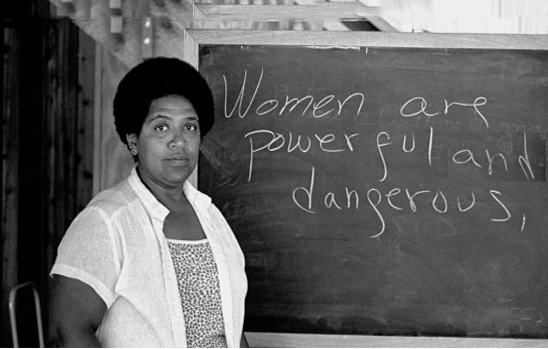I’ve highlighted 10 lesbian writers I think you you should know about, just in time for Women’s History month. Have you ever thought about why Black History Month or Women’s History Month even exist? IMHO we should be should be honoring and celebrating all year round! Its in that spirit that I am choosing to share this post. It’s certainly not an exhaustive list, and I know I left off many worthy folks, but these are some of my favorites.
Labeled as the “Queer Chicana trailblazer”, GLORIA ANZADUA was a queer Chicana poet, writer, and feminist theorist. Her poems and essays explore the anger and isolation of occupying the margins of culture and collective identity. With Cherríe Moraga, Anzaldúa co-edited the landmark anthology This Bridge Called My Back: Writings by Radical Women of Color (1981).
PAT PARKER was an American poet, activist, and writer known for her heartbreaking poetry on the experience of being a gay black woman in the U.S. From 1978-1988 she was the executive director of the Oakland Feminist Women’s Health Center, and she was also somewhat involved in the Black Panther movement. She spent her life advocating for the rights of LGBTQ people, victims of domestic violence, people of color, women, and the intersections among those groups. One of her best known poems, Womanslaughter, is about the murder of her older sister at the hands of her husband, and the lack of justice that followed. Parker died of breast cancer in 1989; she is survived by her long-term partner, Marty Dunham, and their two daughters.
VIRGINIA WOLFE was an English writer and poet, best known as the author of Mrs. Dalloway and A Room of One’s Own. Woolf was a member of the Bloomsbury Group, a group of prominent English literary figures, who, among other things, encouraged a liberal conception of sexuality. This encouragement may have been what allowed Woolf to feel secure enough to have a long-term relationship with poet, writer, and garden designer, Vita Sackville-West. Virginia Woolf’s queer feminist classic Orlando (which you may know from the excellent film adaptation starring Tilda Swinton) is inspired by the events of Sackville-West’s life.
LORRAINE HANSBERRY was the inspiration for Nina Simone’s song “To be young, gifted and Black” Hansberry is best known for her groundbreaking play “A Raisin in the Sun,” about a struggling Black family on Chicago’s South Side. After the play’s release, Hansberry became the first Black playwright and youngest American to win a New York Critics’ Circle Award. The iconic work was then made into a 1961 film starring Sidney Poitier and Ruby Dee.
RADCLYFFE HALLwas a British author and badass butch lesbian who was active in the early 1900s. Her novel “The Well of Loneliness,” published in 1928, was a semi-autobiographical novel about a lesbian who longs to be accepted as a man. Banned in the UK at the time, it was secretly beloved by thousands and remains a crucial contribution to butch lesbian literature.
A self-described “Black, lesbian, feminist, mother, poet, warrior,” AUDRE LORDE made lasting contributions in the fields of feminist theory, critical race studies and queer theory through her pedagogy and writing. Among her most notable works are “Coal” (1976), “The Black Unicorn” (1978), “The Cancer Journals” (1980) and “Zami: A New Spelling of My Name” (1982). “I write for those women who do not speak, for those who do not have a voice because they were so terrified, because we are taught to respect fear more than ourselves. We’ve been taught that silence would save us, but it won’t,” Lorde once said.
LESLIE FEINBERG was an American author and activist. Feinberg wrote Stone Butch Blues, a memoir about hir experience as a butch lesbian in the U.S. Known for hir gender non-conforming expression, Feinberg adjusted hir pronouns and noted that “I like the gender-neutral pronouns ze/hir because it makes it impossible to hold on to gender/sex/sexuality assumptions about a person.”
ANGELA DAVIS is and American activist, educator, and author, known for being a superstar of the Black Panther movement. In 1997, she identified herself as a lesbian in an issue of Out magazine. She is a prolific writer, and her work has taken on issues that face the black community in the United States, specifically black women. Some her works include Women, Race, & Class, Are Prisons Obsolete?, and The Meaning of Freedom: And Other Difficult Dialogues. Davis still writes and teaches, and was recently featured in Ava DuVernay’s documentary 13th. Davis’ activism and writing has mainly been oriented around using education as a method of promoting social change; “We have to talk about liberating minds as well as liberating society.”
When RITA MAE BROWN’s first published novel hit bookstands in 1973, no one had read anything even remotely like it. Rubyfruit Jungle wasn’t the first mainstream lesbian novel, or even the first mainstream lesbian novel to rack up impressive sales—Brown’s bawdy, wry coming-of-age romp was racy, irreverent, and explicitly autobiographical, Rubyfruit Jungle was so popular in its initial release that its first publisher couldn’t keep up with demand. Brown is considered the first openly gay author to enjoy mainstream success.
JEWELLE GOMEZ, (Cape Verdean/Wampanoag/Ioway) is a novelist, poet and cultural worker. She’s the author of eight books including the first Black Lesbian vampyre novel, The Gilda Stories, which has been in print more than 25 years. She’s playwright in residence at New Conservatory Theatre Center which commissioned and produced her trilogy of plays. Read blog posts from Jewelle on Lesbiangc.com!
For more stories of contemporary lesbian trail blazers check out LesbianGameChangers.com and download our free ebook!



